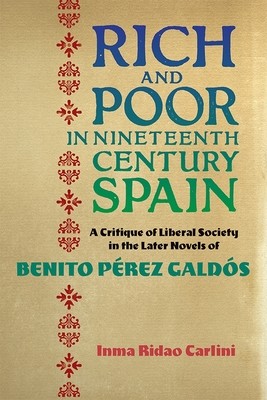
- We will send in 10–14 business days.
- Author: Inma Ridao Carlini
- Publisher: Tamesis Books
- ISBN-10: 1855663309
- ISBN-13: 9781855663305
- Format: 15.6 x 23.4 x 1.4 cm, kieti viršeliai
- Language: English
- SAVE -10% with code: EXTRA
Reviews
Description
A full exploration of Galdós's treatment of questions relating to the creation and distribution of wealth in the modern money-centred society of Restoration Spain.
Winner of the 2017 Peter Bly Award of the Asociación Internacional de Galdosistas Rich and Poor follows Galdós's narrative of the ascent of the bourgeoisie in the speculative climate which resulted from the economic policies of the liberal State. The book also considers the way he portrays the consequences of these policies on the people left behind by the development of capitalism in Spain. Ridao Carlini brings recent scholarshipon nineteenth-century Spanish history together with a wealth of contemporary material--journalism, essays, pamphlets and costumbrista sketches of manner. In this way Galdós's novels are shown to participate in the varied currentsof critical thought - both conservative and socially radical--which questioned the theoretical basis of the Spanish liberal system from the mid-nineteenth century onwards.To this day no other critical work on Galdós has analysed the financial and economic aspects of Galdós's mature novels in the depth they deserve. Ridao Carlini shows that these aspects are central, both to the novels' narrative and to Galdós's understanding of Spanish society as the nineteenth century drew to a close. She also reveals Galdós's perception--one which he shares with other contemporary authors--that he was living through a time of unforeseeable social transformation. Galdós's work appears particularly relevant to us today, since we, like him, live in a time marked by a perception of social and economic uncertainty. Inma Ridao Carlini is a Teaching Fellow in Hispanic Studies, University of Leicester.
EXTRA 10 % discount with code: EXTRA
The promotion ends in 23d.19:59:12
The discount code is valid when purchasing from 10 €. Discounts do not stack.
- Author: Inma Ridao Carlini
- Publisher: Tamesis Books
- ISBN-10: 1855663309
- ISBN-13: 9781855663305
- Format: 15.6 x 23.4 x 1.4 cm, kieti viršeliai
- Language: English English
A full exploration of Galdós's treatment of questions relating to the creation and distribution of wealth in the modern money-centred society of Restoration Spain.
Winner of the 2017 Peter Bly Award of the Asociación Internacional de Galdosistas Rich and Poor follows Galdós's narrative of the ascent of the bourgeoisie in the speculative climate which resulted from the economic policies of the liberal State. The book also considers the way he portrays the consequences of these policies on the people left behind by the development of capitalism in Spain. Ridao Carlini brings recent scholarshipon nineteenth-century Spanish history together with a wealth of contemporary material--journalism, essays, pamphlets and costumbrista sketches of manner. In this way Galdós's novels are shown to participate in the varied currentsof critical thought - both conservative and socially radical--which questioned the theoretical basis of the Spanish liberal system from the mid-nineteenth century onwards.To this day no other critical work on Galdós has analysed the financial and economic aspects of Galdós's mature novels in the depth they deserve. Ridao Carlini shows that these aspects are central, both to the novels' narrative and to Galdós's understanding of Spanish society as the nineteenth century drew to a close. She also reveals Galdós's perception--one which he shares with other contemporary authors--that he was living through a time of unforeseeable social transformation. Galdós's work appears particularly relevant to us today, since we, like him, live in a time marked by a perception of social and economic uncertainty. Inma Ridao Carlini is a Teaching Fellow in Hispanic Studies, University of Leicester.


Reviews